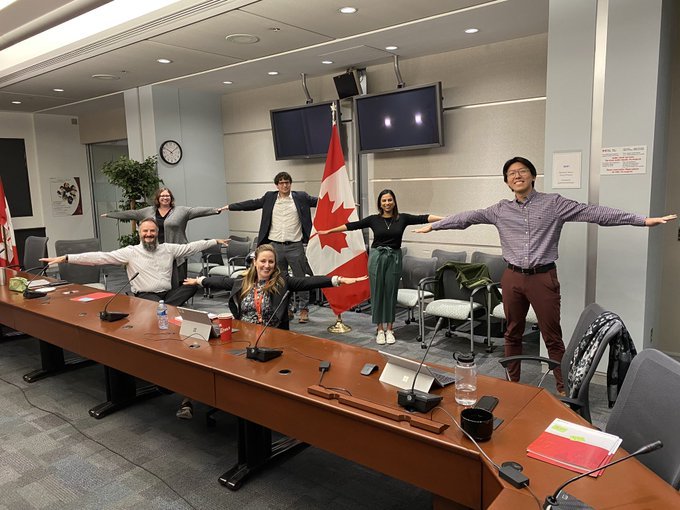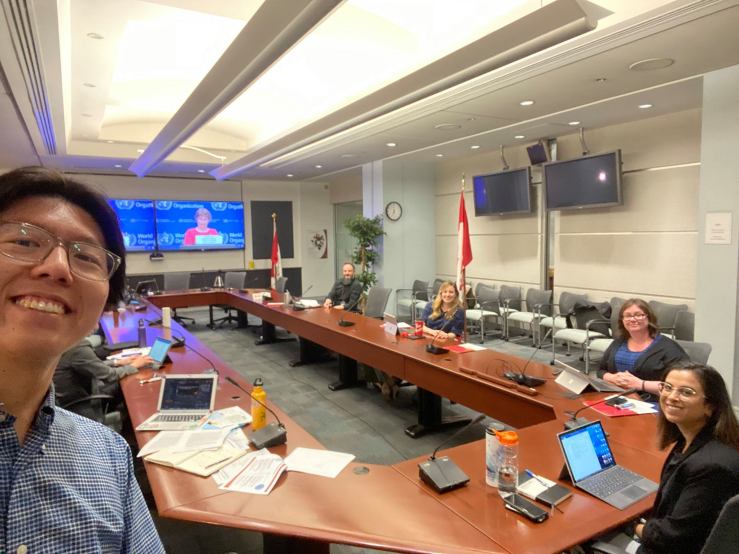The COVID-19 pandemic hit like a terrible storm, hurting people and communities in many different and often disproportionate ways, and we aren’t in the clear yet. The crisis response and recovery effort has been and will continue to be extraordinary, providing an opportunity to build back better – how we will invest and grow a society that we value and reflects the values of equity and justice.
My attention was drawn initially to COVID-19 back in early January 2020, when the outbreak began in Wuhan, China – my birthplace and where many of my relatives live. I’ve been acutely aware of the individual impacts of self-isolation and quarantine, learning of the health impacts and psychological difficulties faced directly from family members in strict lock-down measures as the epidemic grew and public health interventions were put in place. As the COVID-19 pandemic reached Canadian communities, and where I learn, work, and play – the traditional, unceded, and unsurrendered territory of the Algonquin people – I was finishing up my final clinical rotation of medical school in geriatric medicine at the Ottawa Hospital. This came also during my preparations, consultations, and roundtable discussions as the Canadian youth delegate to the 73rd World Health Assembly (WHA) - the highest decision-making body of the World Health Organization (WHO).
For the fifth year in a row, the Government of Canada (Office of International Affairs for the Health Portfolio, Public Health Agency of Canada) has selected a Youth Delegate to join the Canadian delegation at WHA, with the aim of meaningfully including youth perspectives in Canada's global health diplomacy efforts and processes. As the Youth Delegate to WHA73, I consulted youth on global public health issues, reported back to the Government of Canada on summary findings, and shared lessons and reflections with peers on the experience.
Given the exceptional circumstances of a virtual World Health Assembly during the pandemic, many of these conversations were focused on COVID-19 response in anticipation of an adapted WHA agenda. Overall, Canadian youth I spoke with recognized that a multi-sectoral, evidence-based and equity-based approach is critical to an effective response to the current pandemic and future crises that may arise. Four key areas were identified as areas of priority among Canadian youth:
- individual well-being (identity, grief, and belonging)
- prevention and preparedness (investing in public health systems)
- sustainable development (including climate action, planetary health), and;
- education and development (tackling disruptions to education and training).
Similar to many other organizations, conferences, and workplaces in the past few months due to the COVID-19 pandemic, it was announced that the WHA would pivot to a virtual format, and the typically 10-day in-person program hosted at WHO Headquarters in Geneva, Switzerland was reduced to 2 days. From May 18 to 19, 2020, the Canadian delegation convened in-person (while physically distanced!) at Public Health Agency of Canada offices. Together, we watched the opening of WHA, the election of president/vice-presidents for WHA, and many member state interventions, including by Canada’s Minister of Health Patty Hadju. (I was able to capture some of these moments through Instagram updates – you can check out highlights from day 1 and day 2 here).

The Canadian delegation to the first-ever virtual 73rd World Health Assembly attended in-person at the Public Health Agency in Canada. Front row (left to right): Nicolas Palanque, Elisabeth King. Back row (left to right): Kate Trotter, Ryan Melnychuk, Chantele Sitaram, Yipeng Ge
The adoption of the COVID-19 response resolution at WHA, with 194 member states, was quite an exceptional thing during these extraordinary times. An incredible amount of time and energy went into the negotiations process for this resolution, and I was very pleased to see many items discussed with Canadian youth during the consultations process, reflected in this resolution. Some highlights include the importance of universal health coverage and strengthening primary health care, the Sustainable Development Goals, protecting vulnerable populations, and equitable access to medications, vaccinations, technologies. The resolution also calls for the review of the global response to COVID-19, including but not limited to the WHO.
There were also acknowledgements that this is an opportunity to tackle climate change, as these past few months have shown that non-pharmaceutical public health measures to tackle COVID-19 have ‘allow[ed] the earth to breathe again’. Overall, there were resoundingly clear calls and recommendations for a united, collaborative, global effort to address the COVID-19 pandemic – to leave no one behind. With many sentiments from an equity lens to protect those most vulnerable from fragile health systems and building true ‘systems for health’. It has been said that, until everyone is free from COVID-19, the response is not over.
It’s quite an extraordinary year to be the Canadian youth delegate. I find myself in a privileged space of intersectional identities and roles that have provided me with insight and reflection on many aspects of the COVID-19 pandemic response – from a personal lens, a clinical lens, a local public health lens, and from a global health diplomacy lens.
The importance of engaging youth and meaningfully include youth voices and ideas in global public health diplomacy cannot be understated. Youth are not only the next generation of leaders, citizens, policymakers, and healthcare professionals – we will be and already are the generation of peoples living in a world shaped by the decisions and actions (and inactions) made by those that came before us. Youth often identify issues with unparalleled passion, understanding, and virtue – when others turn a blind eye or are complacent to the status quo. As Pearl S. Buck once shared, "The young do not know enough to be prudent, and therefore they attempt the impossible - and achieve it, generation after generation".
Yipeng Ge is a CSIH Board Member and Canada’s official youth delegate to the WHO and Pan-American Health Organization (PAHO) Directing Council. In recent months he has worked in the Public Health Medicine Unit (PHMU) at Ottawa Public Health supporting the COVID-19 public health response. A medical student graduate, Yipeng will embark on his residency training in family medicine and public health and preventive medicine in July 2020.
To read more of his journal entries on global health, including further reflections on WHA73, please visit his website.

